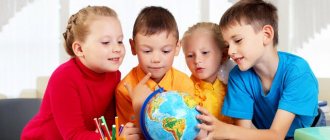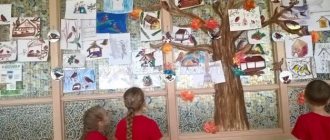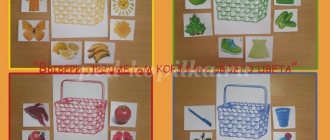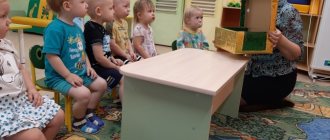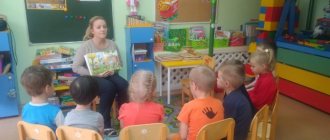Big things start small
The head of the nursery-kindergarten, Marina Ivanovna, who has been working in this educational institution for more than 30 years, admits that she always showed interest in the economic education of children, almost from the first days of working as a teacher: she played games with children in this direction, drew the attention of preschoolers to saving light, water and heat, developed primary ideas about money.
And since 2015, the pedagogical project “Economics for Children or Economic Education of Preschool Children as a Factor in Personal Socialization” has been implemented in the nursery-kindergarten.
Skeptics will say: the economy and preschoolers are too far apart. But don't rush to conclusions. Any big business starts with little things. So you can’t approach economics without mastering the fundamentals of this science. Children must understand that in order to get money out of their pocket, they must first put it there.
To be successful in life and profession, you need to be economically literate - and hardly anyone will argue with this. Familiarization with the basics of this science should begin already in the first link of the education system - a preschool institution, because children’s economics and the first ideas about money and its purpose begin to form at the age of 4-6 years. Understanding these basic principles became the starting point for the kindergarten administration when implementing a project on economic awareness of preschoolers.
The sown grain is already sprouting. During the implementation of the project on economic awareness of preschoolers, and this is already two years, educators note that the children have developed an economic outlook, the pupils have mastered basic economic skills, easily operate with basic concepts of the financial sphere and even distinguish between emotional relations and commodity-money relations.
Of the six kindergarten groups, the project covers two middle and one senior (children over 4 years old). The work of the entire team is aimed primarily at making economics interesting for children and making classes fun and useful.
Brief history and meaning of the term
In the 4th century BC, the ancient Greek historian and prose writer Xenophon created the work “Domostroy”. Cicero translated its name into Latin as Oeconomicus.
Accordingly, the word “economics” is of Greek origin. It consists of two words: oikos, that is, house and the entire household, and nomos - knowledge, rule. It becomes clear that economics in the original sense of the word explains how to run a household.
In the 18th century, economics began to be considered an independent science. This was facilitated by the publication of Adam Smith's The Wealth of Nations in 1776.
As Joseph Schumpeter (Austrian and American political scientist, sociologist and economist) noted, before Adam Smith the structure of economic phenomena was understandable to people, but only at the level of intuition.
The “pickled cucumber” principle
The entire project is designed for three years. Next year it will end, but the idea of frugality, which seems to permeate even the air in kindergarten, is sure to remain.
Here we can safely talk about the famous “pickled cucumber” principle of V. F. Shatalov, an innovative teacher, people's teacher of the USSR, who actively introduced this method in his teaching practice.
He argued that such an environment must be created around the child so that he can contain knowledge within himself, like a cucumber in a jar of pickle.
If the environment is good, then the result will be the same. And it doesn’t matter what size the cucumber is in the brine, sooner or later it will become salty.
So it is here: the economy is at every step, it is in everything, in every movement. Through games, fairy tales, plays, musicals, conversations, activities, and observations, children learn the basics of this seemingly complex science.
5) Think about what sectors of the economy work so that we can drink a glass of milk in the morning
So that we can drink a glass of milk in the morning:
Animal husbandry . Cows give milk.
Packaging industry. The milk is packaged in factory-made containers.
Transport. Milk is delivered to retail outlets.
Trade. Milk is on sale.
Mechanical engineering. A refrigerator is being manufactured.
Glass industry. A glass for milk is being made.
Economics for children - game methods
Children are actively involved in role-playing and didactic games, the purpose of which is to form a caring attitude towards the world around them, as well as to teach children to use both finances and natural resources wisely.
An example of one of these games. A card is placed in the center, which shows, for example, the family budget, and children are asked to think about what they will buy first:
- one is looking for a shopping card,
- the other goes to pay the rent,
- and someone, first of all, finds a card with a picture of the sea.
This is how children learn to set financial priorities.
Economic concepts for children
But economics is inextricably linked with such not entirely pleasant concepts as “greed”, “greed”, “profit” and “waste”. In words, children have difficulty perceiving new concepts, but if they are figuratively presented in the form of textile ugly and even ugly dolls, whose names are Fekla Zhadnaya and Mikhail Tranzhyra, then rest assured that children will remember them forever.
Older students are also familiar with such concepts as “world money” and “advertising”. Together with their parents, kindergarten teachers organized a world money bank, where the currencies of other countries, as well as the single monetary unit of the European Union countries, are clearly demonstrated to children. In order for preschoolers to remember the products of enterprises in their city and country as a whole, teachers made stickers with the symbol of their city and country on the packaging of fake products.
If we invite our children to make a product with their own hands - sculpt it, make it from a construction set, or draw a picture, and then come up with an advertisement for their product, then we will see what kind of smart economists and marketers our students can make in the future. Children are able to highlight only the most valuable characteristics of their product and will convincingly prove that it is the best and necessary in the household.
A story about the livestock industry according to plan for grade 2
- Animal husbandry.
- Produces meat, milk, cheeses, sausages, eggs, wool, honey.
- Provides people with food and clothing.
- The industry employs livestock breeders, veterinarians, milkmaids, shepherds, beekeepers, livestock specialists, horse breeders, poultry farmers and many others.
A story about the trade industry according to plan for 2nd grade
- Trade.
- Provides services for the sale of food, industrial and other household goods to the public.
- Provides communication between product manufacturers and buyers.
- The industry employs salespeople, cashiers, managers, loaders, stackers, sorters, and consultants.
A story about the industry according to plan for grade 2
- Industry.
- Produces various industrial goods: steel, rolled products, machinery and equipment, household appliances, cars, electronics, raw materials and much more.
- Provides industrial goods and services other sectors of the economy.
- The industry employs metallurgists, machine builders, miners, oil workers, mechanics, assemblers, welders, and power engineers.
Children helping parents: planning a budget together
Adults often block children, especially preschoolers, from participating in the economic life of the family, believing that they should not bother a child with money problems. And then they themselves are surprised that their daughter or son doesn’t know anything, doesn’t value money, and are worried about how he will live on his own.
Often in a store you see the following picture: a child persistently asks to buy him candy. The parents’ answer, as a rule, is short: “It’s expensive,” “You don’t need it.”
Lack of experience in distributing family income and lack of involvement in the implementation of the family budget leads to the fact that in the future some young people tend to overestimate their own knowledge of preparedness for life.
Although it’s easy, standing in front of the counter with your child, to find a minute of your time and tell them that 1 ruble is less than 2, and a banana will bring more benefits than a chocolate bar, and it’s cheaper...
Economic awareness begins from these seemingly simple steps for an adult.
The activities of parents, their attitude towards money and things are learned especially strongly by children.
Parents have to solve problems related to various economic activities on a daily basis. It is necessary to make it a rule to invite your children to plan and implement these tasks. Then it will be easier for them to imagine their upcoming independent life, financial planning and work activity.
To do this, parents must distribute household responsibilities, including among children, think through the daily routine together with them, and decide together what the family income consists of and where financial resources are spent.
Basics of financial literacy for schoolchildren
At school age, a child directly encounters the world of money. Pays for lunch in the canteen and transportation, and receives pocket money. Therefore, an important task is to develop a reasonable attitude towards money in a child:
- Discuss the amount of pocket money in advance with your child.
Plan where and what they will go for. Explain that if the child buys ice cream with this money, he will not have enough for travel.
- Have a conversation about protecting money
What to do if someone at school starts extorting money from a child and how best to store it so as not to accidentally lose it.
Make sure that no one threatens the safety of your child or extorts money in your absence. Always know where the student is, listen to what is happening around and quickly contact to help in time using the “Where are my children” application.
- In order for your child to learn how to manage personal finances, draw up a financial plan with him, where all income and expenses will be listed.
You can start with a plan for a month, then for six months and a year.
- The child should know that there are goods that he should never buy, even if someone asks him to do so.
These include cigarettes, alcohol and smoking mixtures.
- Primary school teachers advise against giving large sums of money to students at school, since children at this age do not yet know how to handle money with care and often leave it unattended in a visible place. For example, in an open pocket of a backpack or on a desk.
- Involve your son or daughter in discussing the family budget, planning major purchases and vacations. Together, discuss possible ways to save and cut costs.
- Children's bank cards are now becoming popular (SberKids, Tinkoff Junior, Alfa-Bank children's card and others)
Using such a card, a child can independently pay for travel, meals in the canteen and make purchases in a store. Moreover, all transactions on the card are controlled by parents.
If you decide to buy a child card for your child, make sure that he knows how to use it correctly.
We recommend that all parents who are thinking about getting such a card for their child read detailed material about the nuances of choice, opportunities and dangers - Children's bank card: is it worth getting it, where and at what age?
- Do not reward your child's good performance with money. Do not arrange market relations where there is love and trust.
- Give your child a piggy bank so that he can save money for the thing he needs.
- Help children develop economic thinking
Solve problem situations, play financial games, read educational stories with your child. You will find out what materials will help you with this in the next section.
Forms of work with parents on the economic education of children
In the nursery-kindergarten, various forms of work with parents are used.
Economics for children means economic conversations, classes, business games, consultations, parent meetings, poster information, and even a game of KVN with the participation of moms and dads.
A series of developing cartoons “Auntie Owl's ABC of Money” is offered to parents.
Joint viewing of the lessons “Caution: Money!”, “Loans and Deposits”, “Ability to Save”, “Needs and Opportunities” teaches children how to manage money independently, helps them understand the concept of “family economic security”, and tells them how to curb their needs.
Practice shows that many parents do not need economics for their children at all, and economic education ends with the phrase “Money doesn’t grow on trees.” But financial awareness isn't just talk, it's real action. Children need to see clear examples, otherwise they may not expect results.
Various business games together with parents will provide some help in understanding the secrets of the family budget. Moms and dads are also asked not to forget about such an important point as money-related errands: go to the store, buy groceries yourself and bring back the rest. This is an important and turning point for every child - if he sees that he is trusted!
How to interest a child?
In the nursery, they do not forget about the most important component: in order to teach a child anything, it is necessary to interest him. And children are primarily interested in games and fairy tales. This was the focus of the institution. The students even staged an economic musical, where a sly fox did not want to prepare for winter and spent all the money on a new fur coat. The wolf, on the contrary, approached the issue of wintering thoroughly: he replaced the radiators in the house, installed double-glazed windows, and insulated the walls. So the children clearly explained who ended up in better conditions.
Today, parents proudly share pleasant observations: children began to make sure that they do not turn on the lights in the house in vain, turn off the water tap, when distributing the family budget, determine what is primary and what is secondary, and pay attention to prices in the store.
These are the basic concepts of economics for children, economic skills for preschoolers. Then this knowledge will become a confident basis for more important economic skills.
What will this knowledge give as a result?
Involving a child in the everyday economic environment, taking into account age-related characteristics, will eliminate the barriers that previously arose for those starting to study economics as a new subject already in high school.
Some “advanced” children, already at the age of 8-9, are able to look for goods on their own and on instructions from their parents. So that they are optimal in price and quality. This is especially noticeable when searching in online stores and delivery services.
And, in any case, the children will become much more responsible and adapted to adult, independent life after graduating from school.


